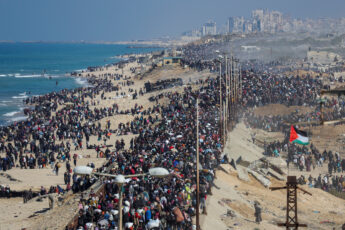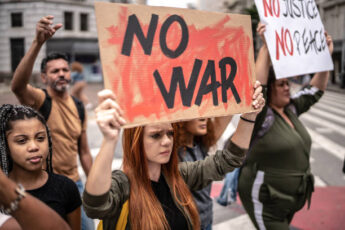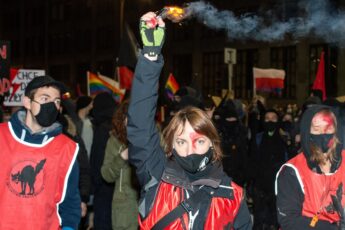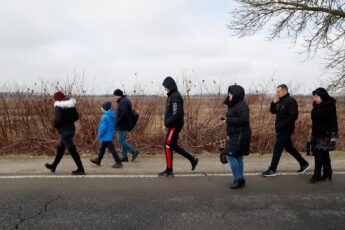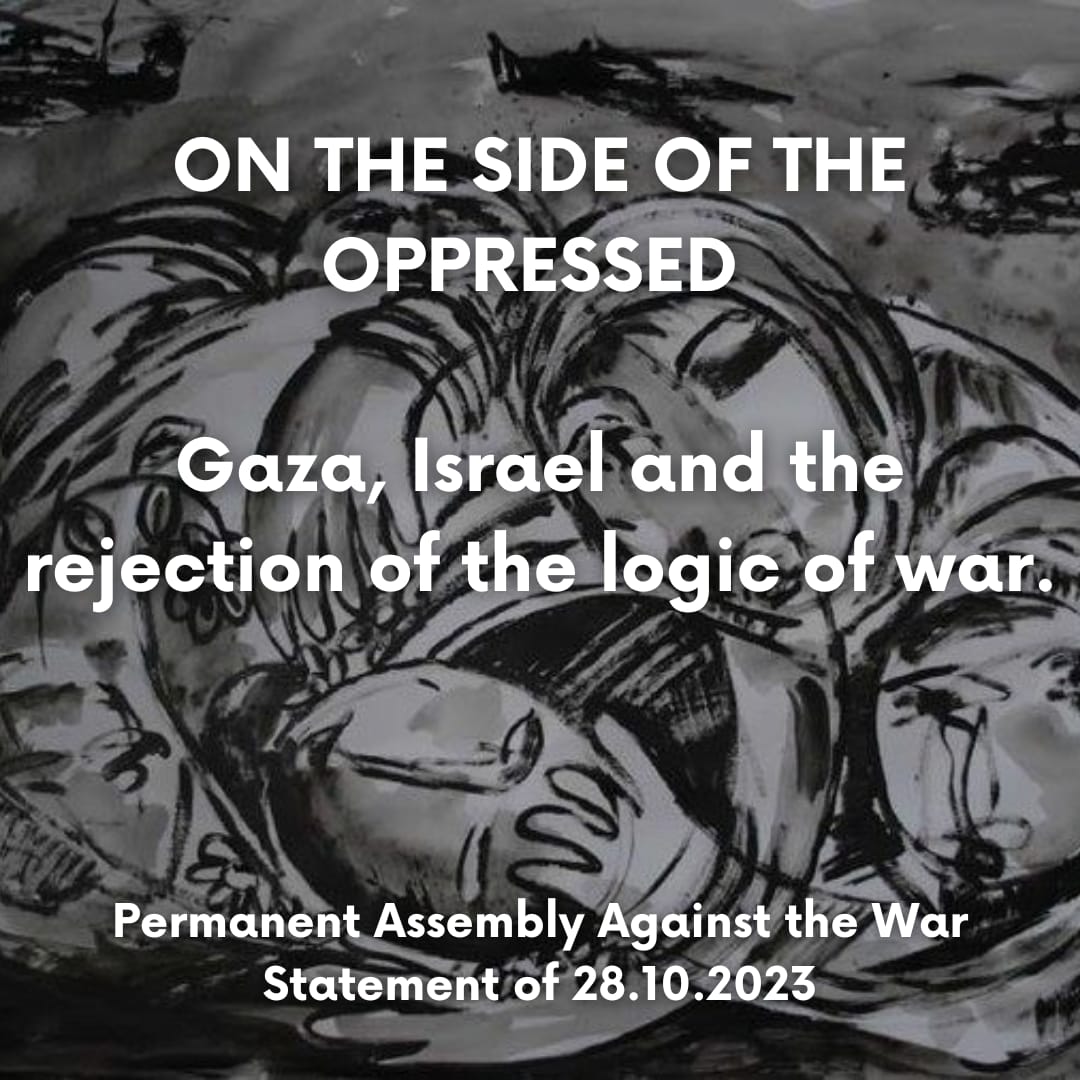
by PERMANENT ASSEMBLY AGAINST THE WAR (PAAW)
Statement of 28.10.2023
Translations: Arab – Hebrew – Ukrainian – Greek – Polish – Italian – French – Romanian – German – Chinese – Japanese
Since October 7th we have been pushed again to take sides, to decide between supporting the long-lasting system of exploitation and violence of the Israeli government or the slaughter led by Hamas in the name of national liberation. We’ve been told by media and by all the institutions who are supporting Israeli policies that either we accept the mass killing of Palestinians or we want to destroy Israel and the Jewish people. The politics of war is rooted in multiple standards that made words such as invasion, right to defend, and humanitarian intervention, almost useless. One occupation is bad, and another occupation is good. The politics of war always finds its justification, we need to struggle and impose our transnational politics of peace.
We call to stop the bombing now in Gaza. We support and participate in demonstrations and actions against occupation and apartheid in Palestine, for an immediate ceasefire and against the military machine. The massacre must stop. But we know this call is not enough to disrupt the logic of war, and the peace we want is not the period between one war and the other.
Since the beginning of the war in Ukraine, and now with the war raging in Palestine, we have seen how governments take a side moved by geopolitical and economic interests, indifferent and blind towards the lives of men, women, children and LGBTQIA* people. We see that those who support the war are also the ones who attack migrants and want to reinforce the border regime and violence. We see that those who threaten escalations are also the ones who want women to stay in a subaltern position. We see that those who support the war are the ones who ask us to work more for the sake of the war effort. To be brave in this situation means to refuse the dichotomies employed by the war logic. It also means to recognize that in the current war in Gaza the two ‘sides’ are not the same, nor homogenous: Palestinians are displaced, divided, and occupied. Arab citizens of Israel, whether Muslim or Christian, and Palestinians in the West Bank are forced to swallow their dissent or to risk being fired, harassed or killed. Israel is also more divided than it seems: Jewish citizens in Israel refuse military service and condemn the war and others are taking to the streets to protest Netanyahu’s actions and to demand the end of the attacks on Gaza, along with many Jewish communities worldwide. The war logic is erasing the demonstrations, strikes and internal struggles that were taking place in Israel and in Gaza, against Netanyahu’s Judicial reform and against Hamas, and also against any project of religious radicalism.
To refuse the existing fronts does not mean that we refuse to take a side, but that we refuse to do so along the divisions that are imposed upon us. We don’t fall prey to easy divisions that push us to side with Israel or with Hamas, with Zelensky or with Putin, with the West or the rest, for these divisions exist only in the heads of our governments and are imposed by them. Refusing the existing fronts means trying to open spaces for our politics, a politics of transnational social movements not hijacked by the geopolitical imaginary of states, nations, ethnicities, or religions. We don’t accept that to fight against injustice and oppression means to accept other injustices and oppressions. There is no liberation if war, violence against women, racism and exploitation continues.
We strike the war and pursue a transnational politics of peace which breaks the barriers and the borders that this war is building. A transnational politics of peace is neither pacification nor simply pacifism. We want to push for a perspective that enables us to establish a political communication across the fronts, to produce organization starting from social struggles and among different subjects to make the opposition to war something more than a movement of opinion. We recognize the individual and collective refusals of the war that are taking place. Our refusal of the logic of war is what allows us to understand which side to take. We take the side of the oppressed, of those who are fighting against death, oppression and the impoverishment produced by the war. What is happening since October 7th has made it harder to continue our struggles, in Gaza, in Israel and all our contexts. In the aftermath of the attack, Israel’s mass slaughter against Gaza, together with the continuation of forced displacement of Palestinians, has multiplied the sources of suffering and rage. While this is taking an unacceptable human toll in the region, and threatening a further expansion of military confrontations, the effects of this war invisibilize and threaten the struggles of migrants, women, queer, and workers, which nonetheless continue to take place.
We refuse the normalization of war and we want the end of killings and destructions in Gaza, as well as in Ukraine. We fight for a transnational politics of peace against racism, violence, and exploitation and by attacking the roots of patriarchal violence, exploitation, and racism, we cross the fronts imposed upon us. As activists of the Permanent Assembly Against the War of the Transnational Social Strike Platform we take a collective commitment to do this in all the local struggles in which we are involved ‒ for the increase of wages, for climate justice, in feminist and migrants’ mobilizations, in the actions against militarization and the border regime – and in all the transnational initiatives we are part of, as the mobilizations towards the 25th November against patriarchal violence and towards the feminist strike of the 8th of March. To continue to struggle, to strengthen political communication and organizing, are our tools to strike the war and define what kind of future we are looking for and how we want to build it: this is our transnational politics of peace.


